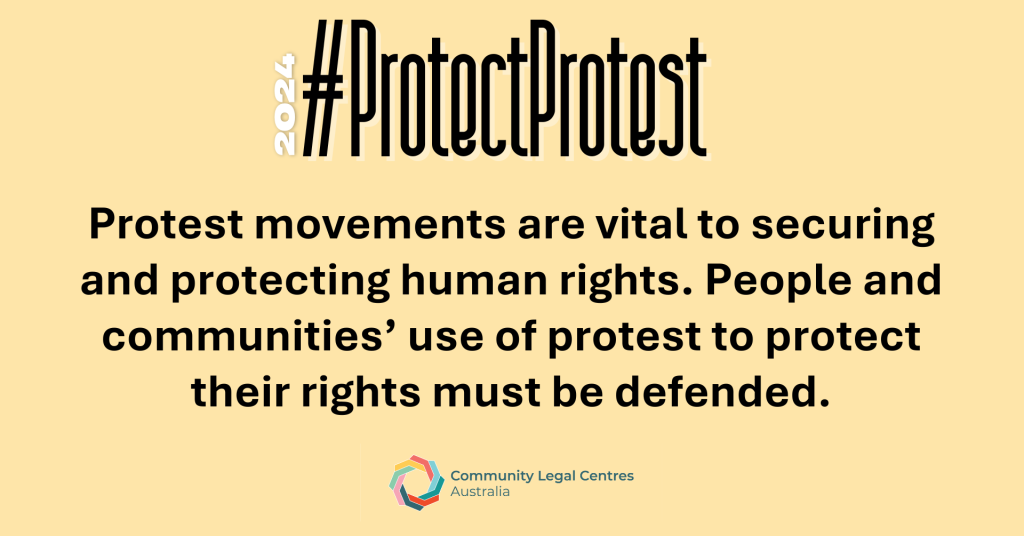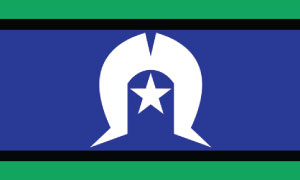Protecting the human right to protest
July 2024
Protest movements are vital to securing and protecting human rights. People and communities’ use of protest to protect their rights must be defended.

Community Legal Centres Australia recognises the importance of grassroots protest movements in securing and protecting human rights.
We have signed on to the Australian Democracy Network’s Declaration of our Right to Protest, which sets out 10 principles underpinning the democratic right to protest. The declaration calls on all state, territory, and federal governments to uphold these principles, not pass any further anti-protest legislation and to wind back existing anti-protest laws. We encourage all human rights organisations (including all community legal centres) that have not yet done so to sign on now, and share.
The first community legal centres were established more than half a century ago by grassroots activists and advocates angered by the injustices their communities faced. They were responding to the unfairnesses of a legal system that punished poverty and difference. To this day, community legal centres, and individual workers, volunteers and unionists in the sector have a strong culture of supporting, endorsing, attending and even leading protest movements for justice and human rights.
Our movement also has a proud history of participating as protest ‘legal observers’ or ‘human rights observers’. Legal observers’ role is to monitor and document interactions between protestors and police to ensure police do not violate human rights and to provide objective reporting where human rights are infringed. In the 1970s, Fitzroy Legal Service and Redfern Legal Centre were amongst the first groups on this continent to do protest legal observing. To this day, community legal centres, organisation, individuals, and union members in our movement, continue to regularly participate as protest legal observers.
Community legal centres recognise the power of protest movements to win justice for people, communities, and the environment.
The 1965 Freedom Ride protests, the 1972 establishment of the Aboriginal Tent Embassy, and the 2020 mobilisations of hundreds of thousands of people across the country protesting in support of Black and Aboriginal lives are just some examples of the crucial importance of protest movements in furthering the rights of First Nations people on this continent.
The 1978 Mardi Gras protest kickstarted the modern LGBTQI+ rights movement in Australia. At the time this was an unlawful protest, which saw immense police brutality and mass arrests. And yet, its value to modern LGBTQI+ rights in Australia has been immeasurable. Redfern Legal Centre, the first community legal centre in NSW, helped to defend many of the people arrested at that first Mardi Gras protest in 1978.
Protests like these have afforded people and communities rights previously, unjustly, denied to them.
When the right to protest is eroded, people’s and communities’ ability to defend other human rights is also eroded.
For years, the right to protest has been under sustained attack across this continent. These threats have grown considerably with the introduction of damaging new laws in several states: in 2022-23, the New South Wales, South Australia, Victorian and Tasmanian Governments each introduced draconian new laws which erode the rights of people and communities taking protest action and threaten them with jail time.
Criminalising protest impacts individual protestors who ultimately end up charged with protest-related ‘crimes.’ It also has a chilling effect on social movements. People may become fearful of the legal repercussions of standing up for justice and stop organising or attending protests. This harms human rights progress.
The criminalisation of protest has far-reaching and damaging implications for our democracy and particularly for the people and communities in our society that already face the greatest structural barriers to justice – those community legal centres make it our business to support.
A recent inquiry has recommended the development and introduction of a Human Rights Act for Australia. This is an important legislative step to enshrine and protect human rights. However, ongoing attacks on the right to protest undermines an equally important tool people and communities can use to secure their human rights.
Governments cannot truly support human rights while continuing to suppress people’s and communities’ ability to protest to secure their rights.


